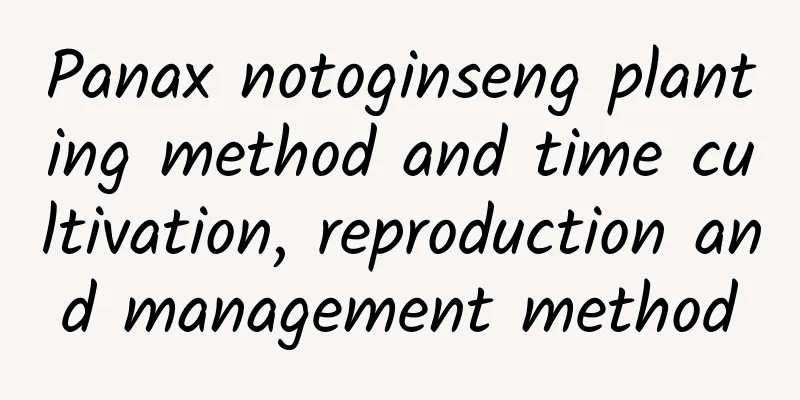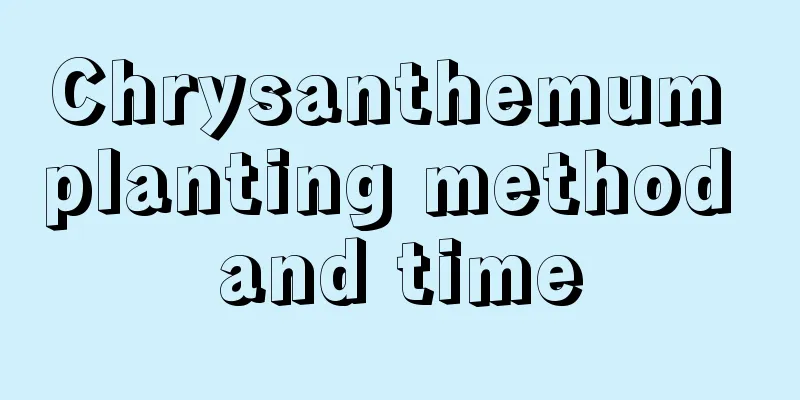Panax notoginseng planting method and time cultivation, reproduction and management method

Suitable planting time for Panax notoginsengPanax notoginseng is generally sown in winter and spring. The planting time varies in different planting locations. Usually, it is sown in late November to December in the southern region, and in March or April in the northern region. Panax notoginseng planting methods and key points1. Select the site: The site for planting Panax notoginseng should have a certain slope to facilitate irrigation and drainage. The soil should be humus soil rich in organic matter or sandy soil or loam. If it is heavy clay, it is not suitable for planting Panax notoginseng. In addition, there must be sufficient water sources near the planting site. 2. Fertilization and ridge making: After selecting the planting site for Panax notoginseng, deep plowing should be carried out and the soil should be disinfected and sterilized before planting. Then, about 5,000 kilograms of decomposed farmyard manure should be applied per mu as base fertilizer, and finally trenches should be dug and ridges should be made. 3. Sowing and seedling raising: Before sowing Panax notoginseng, the seeds need to be screened and disinfected to increase the germination rate of the seeds and isolate the virus. When sowing, spot sowing is carried out according to the row spacing of 6 cm and the plant spacing of 5 cm. After sowing, a layer of straw needs to be covered, which can not only moisturize the soil, but also achieve the effect of heat preservation. Key points for Panax notoginseng management1. Transplantation: Panax notoginseng generally needs to be raised for about one year before it can be transplanted. When transplanting, weak and diseased seedlings can be pulled out, and then they can be planted at a distance of 20 cm between rows and 15 cm between plants. After planting, watering is required in time to increase the survival rate of Panax notoginseng. 2. Fertilization: During the growth of Panax notoginseng, it is necessary to apply fertilizer according to the principle of small amounts and multiple times. This can promote the fullness of the fruits of Panax notoginseng. At the same time, in order to prevent Panax notoginseng from consuming too many nutrients, all the flower stalks can be removed to concentrate the nutrients on the growth of the roots. 3. Pests and diseases: In the process of planting Panax notoginseng, common pests and diseases include damping-off disease, anthracnose, root rot, aphids, scale insects, etc., which can usually be prevented and controlled with Bordeaux mixture or drugs such as thiophanate-methyl and carbendazim. Pests such as aphids and scale insects can generally be prevented and controlled with drugs such as dimethoate emulsifiable concentrate. |
>>: What kind of crop is millet? What crop does millet come from? (Picture)
Recommend
How to grow Clivia leaves so that they are shiny
1. Proper lighting During the cultivation period,...
The difference between water lily and bowl lotus
Introduction to Water Lily and Bowl Lotus Water L...
Tomato seedling raising time and method
Tomato is a vegetable and also a fruit . It can b...
How to grow the peace lily tree to make it flourish
1. Suitable temperature The peace lily likes a wa...
How to care for mountain roses in winter
Is mountain rose afraid of cold? Mountain rose is...
What to do if the climbing rose is hardened and not repotted (How to repot the climbing rose that has already climbed)
Potted flowers can easily cause soil compaction, ...
When is the best time to plant Forsythia?
Forsythia is a common Chinese medicinal herb that...
Is it better to water the flowers in the morning or evening? You must know that if you choose the wrong "time", it will be useless no matter how hard you try to take care of your flowers.
In fact, everyone’s discussion about the time to ...
Chrysanthemum cultivation methods and management
Chrysanthemums , popular for their fall blooms an...
The correct way to water flowers with white vinegar What are the benefits of watering flowers
White vinegar can be used to water flowers to adj...
Where does the red spider lily grow?
The bulb of the red spider lily is nearly spheric...
How to fertilize lavender potted plants
1. Appropriate amount of time Before fertilizing,...
The efficacy and function of Yanhusuo
Edible value Yanhusuo wine Take an appropriate am...
Which flowers are suitable for indoor cultivation?
Common features When growing flowers indoors, we ...
How to grow aloe vera
1. Choose a pot The flowerpot used when growing a...









